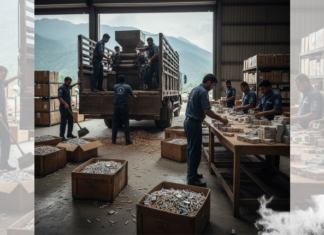The Minister of Defence, Khawaja Muhammad Asif announced yesterday that the government has created an energy conservation plan that can result in savings of billions of Rupees when implemented. Through this plan the government plans to reduce its energy demand.
According to the Pakistan Economic Survey, the import cost for oil grew by 95.9% to $17.03 billion between July and April of FY2022, this accounts for a quarter of the total import bill during the same period standing at $65.5 billion.
Therefore reducing the import bill for oil and petroleum products particularly being used for energy generation can potentially reduce the pressure on the economy. Higher global oil prices and a huge devaluation of the Pakistani rupee make energy more expensive, causing external sector pressure and worsening the country’s trade deficit.
“If we want to live within our means, we need to change our habits,” stated the defence minister. According to Asif, conserving energy from various sources can save billions of rupees. The country is going through one of its worst economic cycles with fast depleting foreign reserves, the country is struggling financially.
Meanwhile, Prime Minister’s Adviser Qamar Zaman Kaira guaranteed that Pakistan will not default. He urged citizens to support the government’s policy. “Pakistan’s largest problem is its import bill, which is $26 to $28 billion and growing. We have no choice but to take these steps, and the nation will have to work with the government ” said the advisor.
Are we late to the party ?
The plan that Pakistan has presented relies primarily on saving electricity. Pakistan relies heavily on fossil fuels such as oil and gas to produce electricity. The strategy primarily focuses on reducing the electricity demand therefore reducing the need to import these expensive fossil fuels.
The Defence Minister in the press conference held on 20th of December was essentially reading out of a plan the power division had presented to the Prime Minister back in October. The plan had been on the cards for sometime but due to unknown reasons has been finally announced publicly.
The cabinet had previously assessed the situation holistically during its meeting on May 10, 2022, and directed the Cabinet Division to form a Ministerial Committee on Energy, Water, and Food Conservation.
According to the cabinet decision, the ministerial committee was formed on June 14, 2022, under the chairmanship of federal minister for defence, with the purpose to evaluate and recommend measures for energy, water, and food conservation.
And finally in a meeting led by Prime Minister Shehbaz Sharif in October, the power division presented the “Efficiency and Conservation Measures Implementation Roadmap” to the cabinet. The cabinet was told how important international events have disrupted the global energy supply chain. As a result, crude oil and imported coal prices have risen dramatically in the last nine months.
The power division had cautioned that the country’s position was becoming unsustainable, and that there was an urgent need to undertake national energy efficiency and conservation measures earlier this year. However political instability and other delays are seeing us implement steps we should have initiated back in May or June.
The “Roadmap”
The committee recommended administrative solutions such as the hybrid work model, the closure of commercial markets at 8 pm, and alternate switching of street lights. These initiatives will result in annual savings of over $568 million. Switching to LED lighting might result in an additional $103 million in annual savings.
Third, the committee reported that approximately 2.65 million fans create an annual loss of approximately 0.68 billion units of electricity. A ban on the manufacture of inefficient fans will result in annual savings of around $69 million.
Installed water geysers use around 105 million mmbts of gas per year, which can be decreased by 25% through installing conical baffles, resulting in annual savings of approximately $419 million.
This would add up to annual savings of $1.15 billion, although Pakistan would have to do much more to reduce the total import bill, regardless these steps should be welcomed by the general considering that this wouldn’t only be beneficial in the short run but for many years to come.
In order to create awareness across the country, the committee also proposed huge energy efficiency and conservation awareness efforts across print, electronic, and social media platforms.
Although this seems like a sound plan in theory, the implementation and effectiveness can only be evaluated a year or two down the road. It would involve a mammoth effort on the part of the government to actually implement these steps, for instance how will the installation of conical baffles be enforced by the government in your home?
The answer to this question is cooperation from the general public for the most part. Another simple answer would be to show how energy conservation is mutually beneficial for all the stakeholders and the economy at large.
But another question arises that even though the federal government has announced these initiatives, being able to implement them at a provincial level would require the federal government to bypass the eighteenth amendment. Here comes in Article 149(4) of the constitution.
What is Article 149(4) of the Pakistan Constitution ?
In case of any resistance from the provinces given how Pakistan is going through one of its usual episodes of political chaos, the government would make use of Article 149(4) of the Pakistan Constitution to ensure cooperation between the provinces.
As per the constitution of Pakistan, the fourth clause of the article grants power to the “federal executive authority” to deliver directives to provinces on the building and maintenance of communication means, and in order to avoid any serious threat to the “peace or tranquility or economic life” of Pakistan.
This said, it can still become a bone of contention in the court of law given the prevalent political chaos in the country.
What have other countries done ?
Countries around the world have taken drastic measures in order to become energy efficient and reduce their own domestic bills while at the same time contributing to reducing the overall import bill of the country.
Simple actions are frequently effective. In India, for example, air conditioner makers are required to set the default temperature of a new device at 24°C. This means that when a person purchases an air conditioning unit, it will automatically cool to 24°C rather than 22 or 20°C. Consumers have the option to change it, but many do not and thus save energy without even realising it.
Similarly a drought caused an electrical shortfall in Chile in 2007 and 2008. Chile avoided power outages by deploying a package of measures that included public awareness campaigns and a scheme to distribute energy-efficient lighting. The government established long term finances for energy efficiency initiatives, instituted rationing, prolonged daylight saving time, and provided financial incentives for conservation.
Following the 1973 oil crisis, Denmark decreased its susceptibility by drastically reducing its reliance on imported oil, diversifying its energy mix, and implementing an ambitious and comprehensive portfolio of energy efficiency initiatives.
Before the crisis, almost all buildings were heated with oil, and the majority of energy was produced with oil. Subsidies and other initiatives lowered the share of electricity generated from oil from 64% to 5% by 1983.
Is it economically feasible?
There are some arguments against the closure of markets and restricting other forms of commercial activity. This would fundamentally reduce economic activity considering the fact that shops and restaurants would be open for fewer hours.
However, the influence of energy efficiency programmes on macroeconomic performance must be better understood and quantified in a systematic manner. Energy efficiency improvements can benefit the entire economy, with direct and indirect effects on economic activity measured by GDP, employment, trade balances, and energy prices.
As the situation stands Pakistan not only requires short term fixes but also long term policies and strategies spanning decades to come. Only then can the country only become sustainable. What Denmark was able to achieve should serve as a prime example for the country as we too have been reliant on imported oil for far too long.
Why is it necessary for Pakistan ?
Cost-effective energy efficiency upgrades can have favourable macroeconomic effects, increasing economic activity and frequently creating more jobs. Efficiency in energy use lowers the amount of energy used to provide services like transportation, lighting, heating, and cooling. Reduced energy service costs free up resources for individuals, corporations, and governments.
Considering the dismal situation of the Pakistan economy, these policies come at a time when the government is struggling to meet its financial commitments and running a fiscal deficit. With energy prices still sky high coupled with lower foreign exchange reserves cutting back expenditures on imported fuel is an absolute priority for the government.
Hence it can be concluded that being energy efficient and reducing the overall import bill can potentially have a huge impact on the overall economic outlook of the country in the long run. However it must be noted that stringent checks and regulation is necessary to ensure implementation of the plans to reap the actual benefits.
As far as the figures being released by the government are concerned, they must be taken with a grain of salt as there is no verifiable method to estimate these numbers. Furthermore at the moment they are only estimates and only after implementation can the actual benefits of the plan be evaluated.
Even though Pakistan has been late to come up with these measures, regardless it must be stated that these policies are better late than never. But only time will tell whether or not these policies would even come into effect or how beneficial these policies would be for Pakistan.























